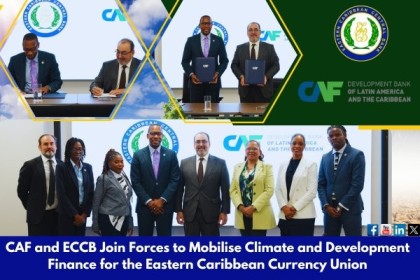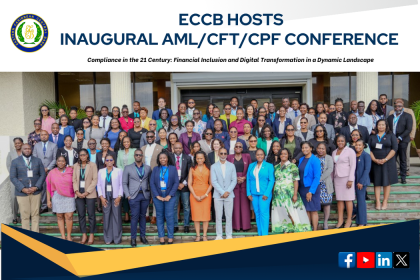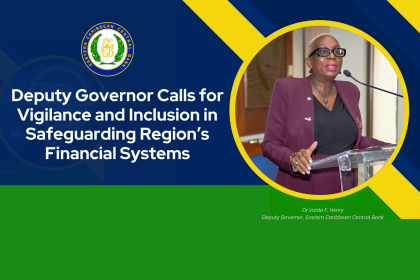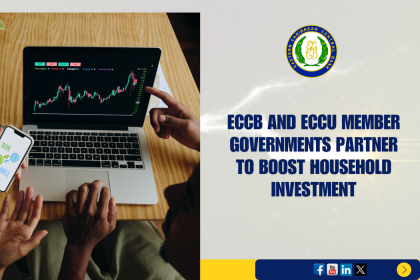
Governor Timothy N.J. Antoine Delivers Keynote Address at Opening Ceremony of 9th Growth and Resilience Dialogue
KEYNOTE ADDRESS BY
TIMOTHY N. J. ANTOINE
GOVERNOR OF THE EASTERN CARIBBEAN CENTRAL BANK
Delivered at the
9th Annual Growth and Resilience Dialogue
Theme: IN PURSUIT OF EXTRAORDINARY EXCELLENCE
Sir Cecil Jacobs Auditorium, ECCB Headquarters
Saint Christopher and Nevis
10 April 2025
Salutations:
Ladies and gentlemen, good morning.
It is my distinct pleasure to welcome each of you to the 9th Growth and Resilience Dialogue at the ECCB.
Welcome to your Central Bank. We work for you!
I especially welcome the Honourable Cora Richardson-Hodge, Premier of Anguilla and Chairman of the Monetary Council, who is making her first visit to the Bank since her assumption to office. Premier, we extend our special welcome and best wishes to you and your government.
Do we have any first-time visitors? Let us applaud them.
To our returning colleagues and guests, welcome back.
I encourage you to enjoy the vitality and beauty of the ECCB Campus.
Be inspired and leave energised.
I express my gratitude for the continued success of this Dialogue. Now in its 9th edition, this Dialogue is unique in its offering as a veritable vehicle for innovation and inspiration, for its collection of diverse participants and talents.
To our partners – OECS Commission, University of the West Indies and the World Bank – I thank you for your enduring enthusiasm and collaboration. I also recognise the efforts of Team ECCB, particularly Sybil Welsh and Karen Williams who spearhead the planning and execution of this annual Dialogue.
Our guiding theme, "In Pursuit of Extraordinary Excellence," ought to remind us of the bold actions required to deliver our "Big Push" agenda which, simply put, is — to double the size of our economy, with shared prosperity for all.
I must confess I had intended to address the theme and sub-themes of the Dialogue but — in light of recent developments — I am compelled to focus my brief remarks on the macro-economic implications of recent geopolitical events. After all, I am guided by former Chairman and CEO of General Electric (GE), Jack Welch’s astute invitation: "Embrace reality as it is, not as you would like it to be.”

Ladies and gentlemen, our Dialogue convenes in a VUCA world. That is, a world characterised by Volatility, Uncertainty, Complexity and Ambiguity. However, in light of the fundamental restructuring of the global economic order, now underway, the likes of which we have not witnessed since the Second World War, I am taking VUCA one step further by suggesting that we are living in a VUCAA (with a double A) world; that is, a world pregnant with Volatility, Uncertainty, Complexity, Ambiguity and Anxiety. This unfolding reality has implications for our region, our countries and for us as individuals.
Several concerns arise. However, our most immediate concerns are inflation and a slowing global economy occasioned by the tariff war. Inflation is a tax on everyone because it reduces the purchasing power of all. However, it is a particularly pernicious tax on the poor and on our most vulnerable families, as well as on businesses, many of which are micro and small. Furthermore, the possible imposition of fines on ships made in China would increase shipping costs exorbitantly and also lead to significant price hikes on goods, including in the construction sector, with attendant implications for affordability and availability. This effect would place pressure on the fiscal situation of our countries, some of which have recovered fairly well since the pandemic.
Most of our economies are currently experiencing a strong rebound in Tourism, with arrivals now surpassing pre-pandemic levels. A slowing global economy or, worse yet, a global recession would reverse this progress. We hope this outcome will be avoided. Evidently, the economic outlook is uncertain and there is much we do not know.

Ladies and gentlemen, one thing we do know is that our EC dollar remains strong. At this moment, the backing is 98.0 per cent, with foreign reserves of EC$6.0 billion and growing. Our EC dollar has stood the test of time. Over nearly five decades, our EC dollar has withstood multiple shocks — and it will withstand this tariff shock.
Our confidence in this assertion is predicated on the ECCB’s longstanding conservative policy of maintaining high stocks of foreign reserves. For us, we have long believed that our conservative approach provides a bulwark of resilience for our small, hyper-open economies and is a veritable insurance policy to help protect our region in times of shocks. As the pandemic attests, this policy served us well then — and it is serving us well now and will continue to serve us well into the future.
Ladies and gentlemen, this crisis must not be wasted! We must meet this moment and emerge even stronger. As I often say, resilience is not merely the capacity to withstand and absorb shocks but to bounce forward — not back, forward!
I now wish to offer three key messages:
Key Messages
- Adopt a Growth Mindset. Such a mindset reframes our current problems as opportunities and will propel our region’s lifelong pursuit of building greater self-reliance and resilience.
- Intensify our focus and implementation of the Big Push agenda, especially in pursuit of food and nutrition security and energy security.
- Accelerate the scope and pace of regional integration and collective action.

Accelerating the Big Push Agenda/Theatres of Transformation .
One area I wish to highlight is food and nutrition security.

As the chart indicates we have considerable work to do to reduce our food import bill. In this regard, I am pleased to note that the ECCB, with the approval of the Monetary Council, recently disbursed a combined grant of $25.0 million to our member countries, to support them in their efforts to boost food production and reduce our region’s food import bill.

Undoubtedly, more investments are required, especially with respect to Meat, Grains, and Fruits and Vegetables, as they account for half of our Food Import Bill. Now is also the time to revisit and diversify the logistics hubs for our region, as well as our intra-regional shipping arrangements.
Ladies and gentlemen, every day, we have a choice: “to curse darkness or light a candle.”
At ECCB, rather than lament our dependence on fossil fuels and the high costs of electricity, we invested in a 1MW solar plant, the largest non-utility plant in the ECCU. Today, I am pleased to confirm that this Dialogue is powered by solar PV. Furthermore, the Bank now saves $1.8 million per year in avoided energy costs.
Energy security is one of the pillars of the Big Push. We cannot transform our region without addressing the high cost of energy. The reliance on fossil fuels for nearly 90.0 per cent of our energy needs exposes our region to market volatility while driving up electricity costs, eroding competitiveness, and undermining our economic stability. Moreover, it exacerbates our climate challenges. In this regard, we welcome and support the OECS Sustainable Energy Greenprint announced at the conclusion of the 3rd OECS Council of Ministers of Energy meeting in February of this year.

The Need to Reimagine our Tourism Model
Periods of high and low visitor arrivals are inevitable, but the goal is to minimise the duration and severity of the low seasons. Why limit ourselves to a seasonal Tourism model?
Consider Singapore, for example, which is on track to surpass its record for international arrivals this year. What is the secret? Singapore ensures that every season is “Tourist season.” It enhances attractions, accelerates digital transformation, uses strategic marketing, and expands global outreach. These efforts help keep Singapore’s Tourism offerings relevant throughout the year.
Approximately 980 million employees are working remotely worldwide. What steps can we take for the ECCU to become a hub for remote work, offering both an appealing environment and the necessary amenities?
Future success requires data-driven actions. British Mathematician Clive Humby coined the term “data is the new oil,” suggesting that, like oil, data must be refined and processed to unlock its true value. Unfortunately, our region faces a significant data deficit and lacks capacity to manage, process and deliver data efficiently. A well-crafted data and AI strategy is essential — not only to enhance operational efficiency, but also to drive competitiveness in this increasingly fast-paced VUCAA world.
Conclusion
As a region, we must be relentless in our pursuit of excellence inspired by Thea Lafond-Gadson, our Triple Jump Olympic gold champion and Julien Alfred, our 100-metre Olympic gold champion among others.
Our central bank was birthed out of struggle and solidarity. When the West Indies Federation collapsed, we had to decide whether to wallow in self-pity or stand together in solidarity. Not unlike this moment, those were anxious times, but that struggle led to a defining moment of clarity and solidarity. Ultimately, it led to the establishment of the OECS (1981) and the ECCB (1983).
Ladies and gentlemen, we are a region of small countries but we are not without agency.
Indeed, we are greater than we know but are often constrained by the handicaps of insularity and our lack of imagination.
Indeed, we are richer than we think — because although we are small island states, we are large ocean states.
Indeed, we are bigger than we realise but we must act together.
As the global economic order fractures and restructures, will we come together to meet this moment? And will we do for ourselves what we can and must do for ourselves at home, while we strenuously advocate abroad for just outcomes?
As we pursue our quest for “extraordinary excellence,” never forget:
“As a region, we cannot change our history and we cannot change our geography but we can and must elevate our development trajectory through innovation and collective action.”
I thank you.
References
Dyvik, E. (2024, July 4). Number of employees worldwide 1991-2023, by gender. https://www.statista.com/statistics/1258612/global-employment-figures/
Georgieva, K. (2024, January 14). AI Will Transform the Global Economy. Let’s Make Sure It Benefits Humanity. https://www.imf.org/en/Blogs/Articles/2024/01/14/ai-will-transform-the-global-economy-lets-make-sure-it-benefits-humanity?utm_source=chatgpt.com
International Renewable Energy Agency. (2023, March 20). Renewable Capacity Highlights. https://www.irena.org/-/media/Files/IRENA/Agency/Publication/2023/Mar/IRENA_-RE_Capacity_Highlights_2023.pdf?utm_source=chatgpt.com
Lopez, A. (2024, May 22). Most tourism-dependent economies in the Caribbean 2022. https://www.statista.com/statistics/789517/caribbean-direct-contribution-travel-tourism-gdp-country/
Sherif, A. (2024, November 12). Share of employees working primarily remotely worldwide 2015—2023. https://www.statista.com/statistics/1450450/employees-remote-work-share/
Welch, J., & Welch, S. (2005). Winning. Harper Business.
World Economic Forum. (2020, October 20). Recession and Automation Changes Our Future of Work, But There are Jobs Coming, Report Says. World Economic Forum. https://www.weforum.org/press/2020/10/recession-and-automation-changes-our-future-of-work-but-there-are-jobs-coming-report-says-52c5162fce/
About the Eastern Caribbean Central Bank
The Eastern Caribbean Central Bank (ECCB) was established in October 1983. The ECCB is the Monetary Authority for: Anguilla, Antigua and Barbuda, Commonwealth of Dominica, Grenada, Montserrat, Saint Christopher (St Kitts) and Nevis, Saint Lucia and Saint Vincent and the Grenadines.
Media Contact: Shermalon Kirby, Director, Corporate Relations Department
Phone: (869) 465-2537 | Mobile: (869) 662-2561
E-mail: info@eccb-centralbank.org
We invite you to connect with us and learn more about our work
Visit our Website: https://www.eccb-centralbank.org/
Follow us on Facebook: https://www.facebook.com/ECCBConnects
Subscribe to our YouTube channel: https://www.youtube.com/@eccbconnects2295
Connect with us on LinkedIn: https://www.linkedin.com/company/eccbconnects/






